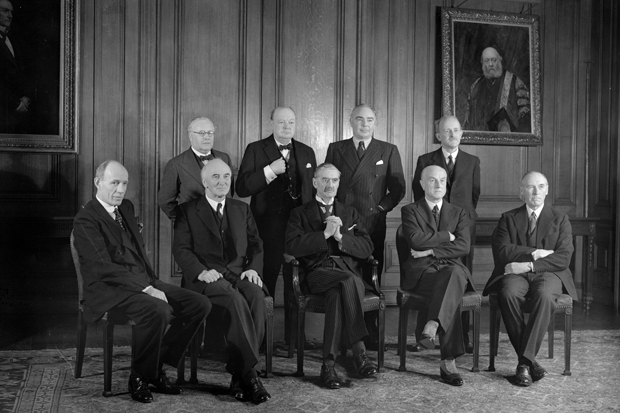Coalitions, as David Cameron has discovered, are tricky things to manage. How much more difficult, then, was it for Winston Churchill as he struggled to survive, then win, a world war, while at the same time managing his fractious three-party administration at home.
In this scholarly, yet grippingly readable study of the wartime coalition, Jonathan Schneer, an Anglophile American academic, reveals how much of a myth the popular legend of a political class and nation united behind their belligerent war leader truly was.
Rather than the resolute, single-minded team rolling up their sleeves for the coming fight as portrayed by David Low in his famous cartoon ‘All Behind You, Winston’ published in the Evening Standard on 14 May 1940, Schneer shows us a team of rivals riven by personal as well as political discord, plotting to replace the great man who led them.
As Churchill himself wrote of his equally ferocious hero Georges Clemenceau when ‘the Tiger’ was appointed premier of France in the first world war, his reluctant fellow politicians ‘would have done anything to avoid putting him there, but having put him there felt they must obey’.
That distrust of Churchill, and reluctance to put him in power, was particularly pronounced in his own Conservative party. Not only had he, in his own words, ‘ratted’ from the Tories to the Liberals and then ‘re-ratted’ back again; his long career had been littered with errors and disasters that would have destroyed a lesser man.
The bloody beaches of Gallipoli, returning to the gold standard, opposing Indian independence and backing the wretched Edward VIII during the abdication crisis were the inglorious milestones where Churchill had either spectacularly fouled up or found himself isolated on the wrong side of history.
But in the supreme crisis of 1940, as Hitler’s armies overran first Denmark and Norway and then invaded France, Belgium and Luxembourg, only one question mattered: who had a consistent record in opposing the appeasement of Nazi Germany, and who had the necessary qualities of ruthless resolution required to fight and win the war? Churchill’s was the only name left in the hat.







Comments
Join the debate for just £1 a month
Be part of the conversation with other Spectator readers by getting your first three months for £3.
UNLOCK ACCESS Just £1 a monthAlready a subscriber? Log in